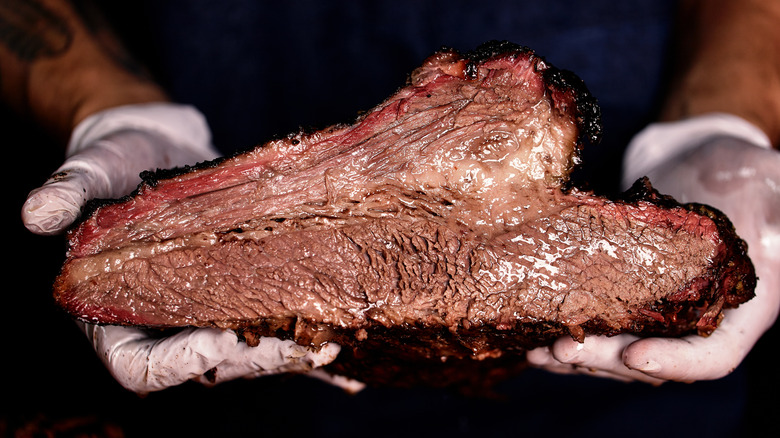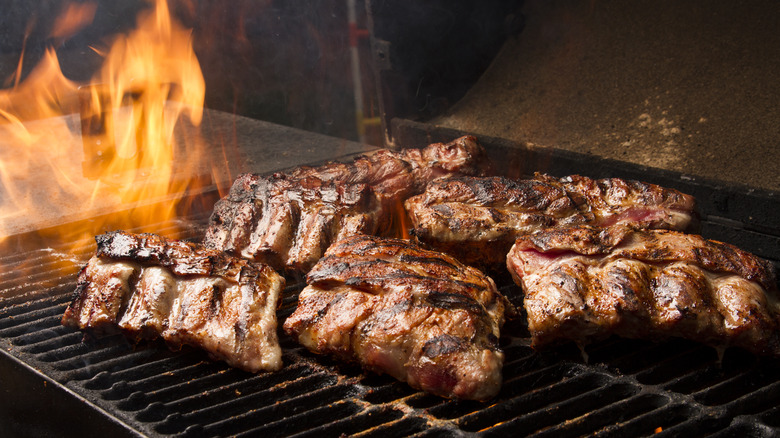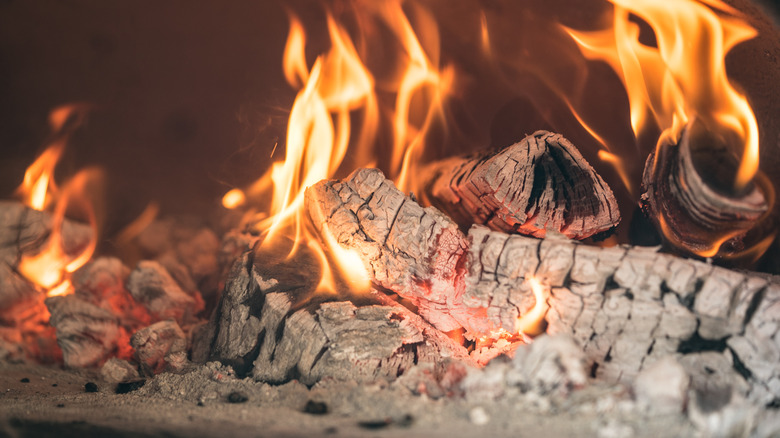When It Comes To Smoking Meat, Less Wood Is More
Americans love their smoked meats: BBQ is one of this country's signature dishes and practically a religion in states like Texas and Missouri. Tons of different states (mostly in the South) each have their own varieties of regional BBQ, complete with not just ingredient differences (and wildly varying types of BBQ sauce), but also cooking methods. Heck, a lot of Texans wouldn't even consider BBQ from other states to be BBQ.
But despite the wide variance in BBQ styles, there are some commonalities when it comes to do's and don'ts. There are a lot of these: make sure you cook slowly, don't use the cheapest possible cuts of meat, don't continually open the grill or smoker to check on your protein progress, don't use lighter fluid to start a charcoal fire. But one of the key ones sounds counterintuitive: Don't use too much wood. The reason? Too much smoke can lend meat an acrid taste, so you don't actually want to trap too much of it in your smoking vessel.
Too much wood and smoke will ruin your meat
The key is that you don't want BBQ to only taste like smoke. The trick here is in the amount of wood: Start with two ounces and add more wood as needed. You also don't want to close the vents on your grill in an effort to keep smoke in — you want to let a bit of smoke escape without letting all of it out. On the flip side, you don't want to continually open the lid to check your meat's progress. You also want the smoke to smell good. If it has a bitter, acrid tinge to it because you used too much wood, the meat is going to be imbued with that same flavor.
As smoking can take a long time, it's important also to keep smoked meats juicy without under-smoking your meat. Try misting: Using apple cider vinegar, apple juice, beer, Worcestershire sauce, beef brother, melted butter, or water, you can periodically spray the meat during the cooking process. Not only will this help keep the meat as juicy as possible, the wetter meat is more likely to trap smoke flavor (without going overboard).
Types of wood have a huge effect on BBQ results
The amount of wood used in BBQ and smoking isn't the only way wood can affect the entire process. Various kinds of wood have various effects on the meat itself. First of all, you definitely don't want to use softwoods with a higher sap content like pine, fir, cedar, or spruce. These may be great as Christmas trees, but that high sap level can give meats a weird taste and even make some people sick — not surprising, since the breakdown of that sap creates the same chemical compounds used to produce certain soaps. Instead, you want to stick to harder woods like hickory, mesquite, oak, or maple.
As far as which of those hardwoods to use in which situation, it really depends on personal preference. Oak is a great wood for those new to BBQ, because it's both forgiving and not overpowering. Hickory is extremely versatile, but sensitive to the too-much-wood issue — it's much easier to go overboard with hickory smoke than most others. Maple is mild and slightly sweet, if you'd prefer a more delicate flavor. Mesquite is known for its particularly strong flavor.
The important thing is to know your product and what you're working with. As long as you don't use too much wood and stick with the traditional BBQ varieties, you should be in good shape.


